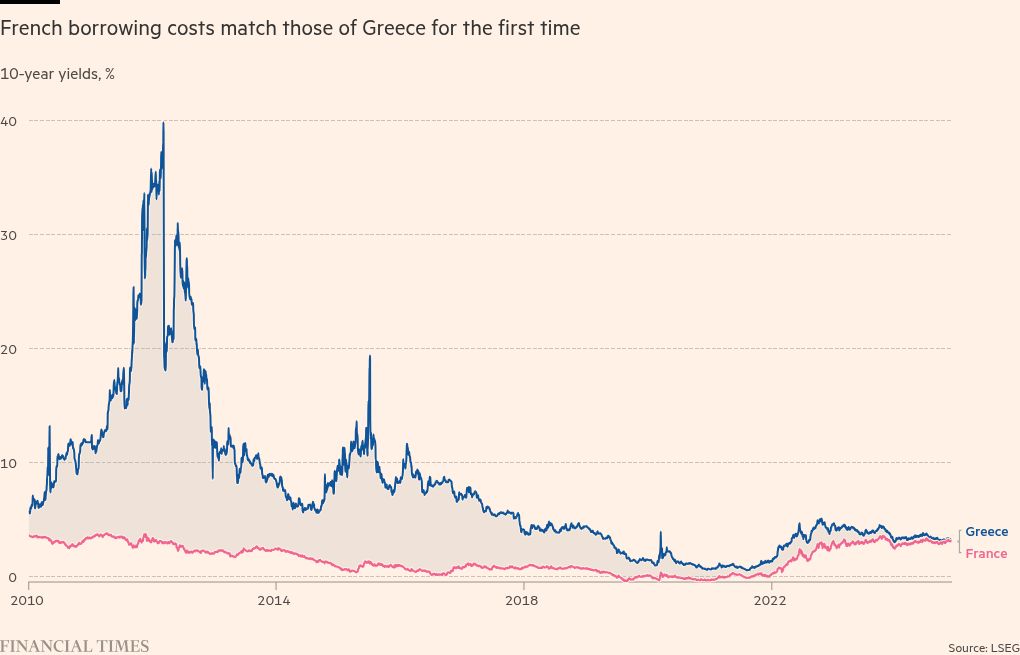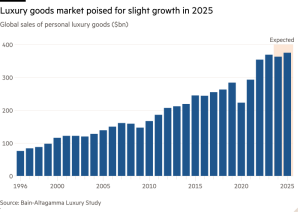France should heed the ‘grumpy mum’ warnings on debt

Unlock the Editor’s Digest for free
Roula Khalaf, Editor of the FT, selects her favourite stories in this weekly newsletter.
France’s finance minister has activated “grumpy mum mode” and drawn the driest of grins from bond market greybeards. Grumpy mums sometimes rely on a go-to example of a flaky relative to try and bend unruly teenagers to their will. “If you don’t do your homework, you’ll fail your exams and end up like Uncle Charlie,” for example.
In this case, stung by the sight of French government borrowing costs drawing level with those of the Eurozone’s once most problematic member, Antoine Armand sought to corral parliamentarians in to compromise by declaring: “France is not Greece”.
His statement highlights the unspoken hierarchy inside the supposedly harmonious Eurozone and illustrates a well-worn truth: politicians need dystopian examples to nudge rivals and voters towards understanding the perils of messing with seemingly arcane bond markets. Grumpy mums need Uncle Charlie.
Based on today’s borrowing costs, bond investors agree with Armand — just. President Emmanuel Macron’s electoral gamble in the summer, in which the far-right was denied power in parliament thanks only to a second-round rally around the centre, has hurt French bond prices for the rest of this year and kept yields elevated even while interest rates have been falling.
Having started 2024 at about 2.6 per cent, French 10-year yields have drifted up to almost 3 per cent now. But what matters is the gap between one country’s yields and another’s. Now, the gap from Germany to France stands at almost 0.9 percentage points — the widest since the wild days of the Eurozone debt crisis a decade ago, when investors rushed for the safety of Germany. That is bad enough, making it tough for the European Central Bank to come up with one-size-fits-all monetary policy, but some analysts believe that without a budget and a path forward for the French government, that spread could swing out to a full percentage point.
The convergence of French yields with Greece’s, though, really bites, suggesting a demotion for France to what bond investors call Europe’s “periphery”, or second tier. Greece was the home of the biggest government debt restructuring, in a grinding and vicious drama that came close to killing the grand European project altogether. Its 10-year yields peaked at about 40 per cent in March 2012 and the rescue package left scars on all sides.
Today, Greece is back in the game. At the same time as Macron’s snap election first rattled French debt in June, Prime Minister Kyriakos Mitsotakis revealed the country’s intention to repay billions of euros in emergency funding far ahead of schedule. Greek yields are now almost precisely level with those of France, and even tucked just below them for a brief time on Thursday. Quelle horreur.
To be clear, France is not even remotely close to the debt emergency that almost ejected Greece from the Euro area. Nonetheless, investors are taking a very dim view of France’s political soap opera, especially at a time when the prospect of ramped-up US trade tariffs demands a cohesive European response.
Armand’s quip rekindled some memories among veterans of the Eurozone debt crisis of the early 2010s, because then politicians pointing fingers at flaky relatives feeling the ire of bond vigilantes was a common occurrence. “Spain is not Greece,” declared Spain’s finance minister in 2010. “Ireland is not in ‘Greek Territory’,” Ireland’s finance minister remarked in November 2010. “Greece is not Ireland,” his Greek counterpart later retorted.
Greece was not always the main character here. Perhaps the most famous example came from former Spanish prime minister Mariano Rajoy, who reportedly declared during talks over the bailout of Spanish banks that “Spain is not Uganda”. Uganda was not impressed.
But Greece just keeps on cropping up. In 2009, then shadow UK chancellor George Osborne warned that unless Britain pulled its financial act together, it risked becoming the new Greece. Of course, it was a subsequent chancellor from Osborne’s own Conservative party who, along with prime minister Liz Truss, tanked the UK government bond market. Since then, governments around the world have lived in fear of a “Liz Truss moment” — a sudden and punishing loss of market confidence. The risk of the US experiencing such a fate under Donald Trump’s second presidency is a long shot, but real.
For now, France is not the Greece of 2012, and Prime Minister Michel Barnier is not Liz Truss. But French MPs would do well to take heed of the real-world stakes of bond-market blow-ups. Posturing politicians often forget, but losing the faith of the bond market spreads pain to businesses and households.
#France #heed #grumpy #mum #warnings #debt





